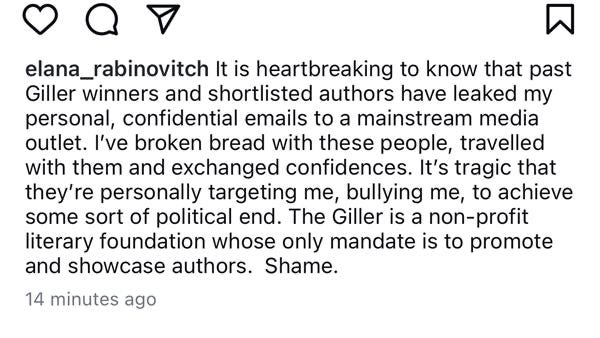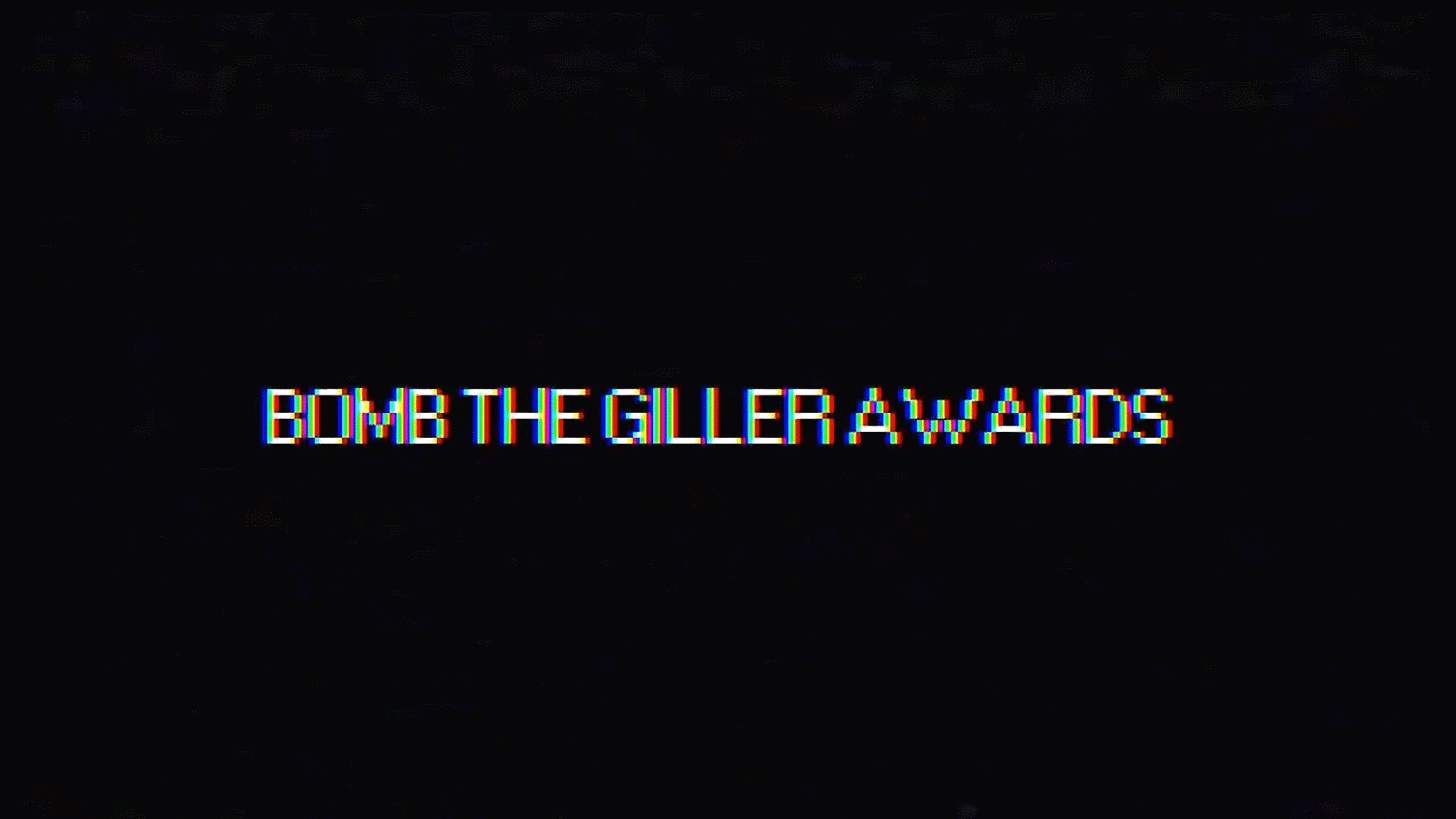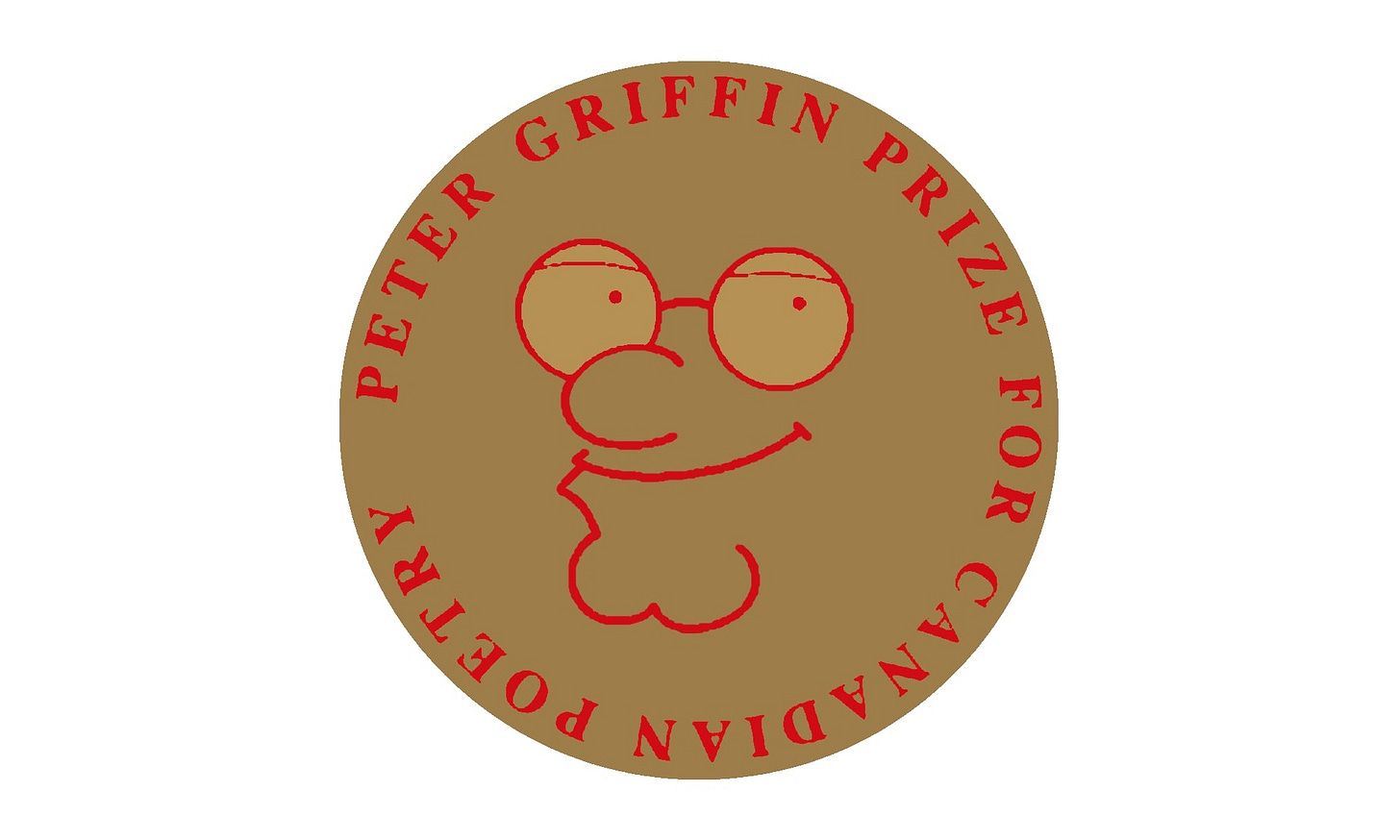Giller Prize spotted panhandling for funding outside Parliament
If Ottawa says no to its pleas, why not try Tel Aviv?
OTTAWA—Times are tough for private literary prizes in Canada. To whit, the Giller Prize was spotted early Wednesday morning panhandling for federal funding on Wellington Street near the East Block of Parliament. Known for its gaudy televised galas and myriad connections to the Zionist industrial complex, eyewitnesses reported the venerable 31-year-old foundation wearing grimy, Victorian-era rags and rattling a metal mug at passing bureaucrats. The once well-heeled literary prize has fallen on hard times since its 18-year agreement with title sponsor Scotiabank was allowed to expire back in February in the face of withering criticism from authors and activists over the bank’s substantial investments in Israeli defence contractor Elbit Systems, the primary provider of military hardware for the IDF.
According to a heartbreaking press release scrawled in sharpie on a square of cardboard by Giller Foundation Executive Director Elana Rabinovitch,
i AM iN UrGeNt nEeD Of fInAnCiAl aSsIsTaNcE. wItHoUt sTaBLE FuNdInG, tHe gILeR WiL bE FoRsEd tO SeAsE OpErAtIoNs aT ThE EnD Of 2025. PLEaSe HElP. nEeD fiVe MILLiOn dOlaR for CAnAPÉs. EVeRY litLe bIT hELPs.”
Despite their appalling penury, however, the Gillers are not friendless. After obtaining the troublingly moist letter that the pigeon-shit speckled Rabinovitch furtively jammed into the mailbox of the Ministry of Canadian Identity and Culture this week, The Globe & Mail rushed to the Foundation’s aid with a sycophantic op-ed from Marsha Lederman entitled, “The Giller Prize was a rare CanLit success story. Now it might become a casualty of a foreign war”:
“There has been a feeling in some circles that [the Giller divestment campaign] isn’t just about Scotiabank’s military investments. Was antisemitism at play? The prize was created by Jewish philanthropist Jack Rabinovitch and Indigo is led by Heather Reisman and Gerald Schwartz, also Jewish. (The protest against Indigo relates to a charity the couple runs that provides scholarships to former lone soldiers in the Israeli army.)1
If the problem was Scotiabank’s sponsorship, why wasn’t this energy being directed more vigorously at the bank itself, rather than the literary award it sponsored?”
For those who have not been following the news, the “foreign war” Lederman obliquely refers to is Israel’s 21-month-and-counting assault on Palestine2, Lebanon, Syria, Yemen, and Iran in which hundreds of thousands of innocent civilians have been butchered using Elbit technologies, backed by the ideological air cover provided by Zionist lobbies and their allies in journalistic and cultural spheres. In fairness, Lederman asks an apt question about why there has been so much pressure on the plucky Giller Foundation instead of on Scotiabank itself—or rather, it would be an apt question, had there not been a vigorous, coordinated, international divestment movement specifically targeted at Scotiabank for going on two years now. Still, that minor detail aside, obviously there is no excuse for “ugliness,” Lederman’s preferred term for the conflicts protestors have introduced to the formerly chummy Gillerverse. It’s not as though these various pressure campaigns, of which the Giller protests were among the highest profile, caused a material divestment from the Israeli war machine. And indeed, despite a well-publicized dump of nearly 80% of its Elbit stock in 2024 which many (including, apparently, Elbit’s CEO Bezhalel Machlis3) linked directly to said pressure campaigns, Scotiabank’s investment has once again begun to inch up—which would if nothing else seem to be confirmation that Scotiabank is a rather Evil partner for an arts organization! Perhaps in the end the activists who risked their personal freedom to ensure that their country’s literary culture would not be so directly fed on Palestinian blood will have to settle for their country’s literary culture merely not being so directly fed on Palestinian blood.

Lederman’s op-ed is rife with the classic liberal Zionist tactic of placing their own discomfort with criticism of Israel on the same plane of suffering as that of their Arab and Palestinian counterparts, hoping that the “complications” of the situation will lead the third-party observer to throw their hands up and call it even. In November of last year, well before Rabinovitch had begun squeegeeing cars stuck in traffic outside the Chateau Laurier, the Toronto Star reported on the tantrum she directed at Giller-winners-cum-boycotteers Madeleine Thien and Omar El Akkad (among others) that basically spelled the end of any lingering goodwill towards the Foundation in the arts community. Some choice quotes from Rabinovitch:
After 40 notable writers shared an open letter in July 2024 stating that the Gillers’ ongoing acceptance of funding from Scotiabank amounted to complicity in genocide, Rabinovitch accused their campaign of “pure antisemitism,” adding, “‘I believe, as do many, that these people are coming after me because of my Jewy last name.’”
In September and October, Rabinovitch responded to a further letter making the simple request that her foundation “divest from companies whose products are currently used in mass killing” by stating the writers’ campaign had “the unmistakable whiff of a pile-on, of bullying and outright intimidation,” summing it up as an example of “Jew-hatred.”
In Lederman’s formulation, this “ugliness” on Rabinovitch’s part was an emotional response to feeling (which is apparently the same thing as being) “utterly betrayed” by the CanLit community she had so tirelessly been employed to hang out with by the company her father founded.

There is a very particular kind of red-faced bluster that manifests when someone accustomed to being pandered to is asked, however gently, to consider the possibility that they might be in the wrong. Typically, their response is to disqualify said critique by framing it as both a.) a personal attack (i.e. “bullying”) and b.) motivated by some moral failing in the accuser (e.g. jealousy, racism, sexism etc.). Bluster is the only recourse of the liberal Zionist because their worldview is fundamentally incoherent: the existence of Israel as a colonial state cannot be justified in terms consistent with the egalitarian, humanist values they so proudly espouse on other topics. Appalled as they may be by the details of the massacres and the nakedly racist rhetoric of Netanyahu’s cronies, there is still no red line that the IDF can cross that would make them willing to question their core belief that Israel in its present form should exist. This belief is taken to be a personal matter (the Middle East is so far away!), despite the fact that Israel (let alone its current war effort) could not continue to function without extensive international support. Because “business as usual” has tended to benefit both Israel and themselves, attempts to force them to consider how their own unswerving allegiance implicates them (such as by signing an open letter) must be treated as an act of aggression to be met by whatever force is required to suppress it.
The irony in this specific case is that many of the Giller protestors did not initially consider the Foundation itself to be anti-Palestinian—rather, they hoped to strike at Scotiabank’s ability to use the prize to launder its reputation and to sever a key financial link between the Canadian arts community and the ongoing occupation and genocide. It was Rabinovitch’s response that collapsed the distinction. Lederman is again helpful for elucidating this mental process. In her July 10 op-ed “We need to talk about antisemitism,” in which she argues that Twitter’s Grok LLM’s recent “mecha-Hitler” meltdown was due to it being fed on the toxic discourse spread by pro-Palestinian agitators,4 Lederman runs down a long list of examples of “Jews feeling unsafe” due to the “unfriendly environment” in public spaces brought on by protests:
“One could argue it’s Zionists being targeted, not Jews. But most Jews are Zionists, believing a State of Israel has a right to exist. Further, too often, ‘Zionist’ is a convenient substitute for ‘Jew.’
Criticism of the Israeli government is absolutely fair. But veering into antisemitism does nothing for the worthy Palestinian cause. If anything, it taints it. It is distracting, divisive and counterproductive.”
Lederman hopes that by removing what daylight exists between “Zionist” and “Jew” she can turn the prospect of critiquing Israel without being antisemitic into such an insoluble logical problem that anti-Zionists will be mentally incapacitated. What she fails to understand (because she is functionally a member of a cult) is that this line of argument makes her people less safe, not more. Let’s assume for a second that people are as thick as she seems to think they are, and can have only a binary opinion on any question. If “Jew” and “Zionist” are accepted as synonymous, and the world is watching Zionist Israelis kill hundreds of people every day on their phones, which of the following conclusions does it seem more likely non-Jews (particularly those who do in fact have a predisposition to antisemitism) will arrive at:
“This Gaza thing might be a little extreme, but it would be racist to my friend Jerry if I said anything”; or,
“Jews are collectively responsible for this horror and they must be stopped.”
In my view, forcing the conversation to that fork in the road would ultimately be a disastrous result for diasporic Jews, Zionist and anti-Zionist alike, at a time when Jews have, by any conceivable metric, never been safer or less oppressed in their history. Whatever the short-term gains it offers in terms of Canadian Zionists “not having to feel uncomfortable in public about doing business with genocidaires,” the long-term consequences for their children will be tantamount to a curse.
What the Giller boycott campaign has ultimately proven, thanks to Rabinovitch’s hamfisted response to it, is that, independent of its sponsors, the Giller Foundation is a Zionist organization. Where there was once a haze of possible coincidence around the fact that its three chief sponsors all happened to have deep connections to Israeli colonialism, we can now say the Gillers not only accepted their blood money but approved of their complicity: Indigo’s military recruitment, the Azrieli Foundation’s West Bank settlement construction,5 Scotiabank’s Elbit-branded drones. In 2025, there is no such thing as a conveniently “foreign war,” and the Giller Foundation’s allegiance is clear.
Now that the Zionist (or in Scotiabank’s case, amorally capitalist) funders have been forced to detach from the Zionist arts organization on account of the whole thing being too messily Zionist-coded to be an effective artwashing apparatus, the Gillers are, to use a term of art, totally fucked, which is why they have turned as a last resort to Ottawa—at a time when the federal government has announced $25 billion in austerity cuts to accommodate the massive increase in military spending mandated by Washington. I would bang on about how awful it would be for the feds to bail out the Gillers when any extra money should go to the already-publicly funded Governor General’s Awards, but why waste my time? That money isn’t coming, and the GGs will be lucky to continue operating at their current funding level as it is.
In all sincerity, at this point the Gillers might as well phone up any friends they have in Tel Aviv to see if the Israeli government will fund them. Imagine the ghoulish CBC Gem-televised spectacle of the Giller Prize being turned down every year by whatever Jewish-Canadian author with an ounce of dignity they attempt to foist it on, the annual outing of spineless comprador hacks who accept as the second, third, or twenty-eighth choice, the bulky ex-Mossad dudes with assault rifles posted at the exits gently suggesting when the audience should cheer.
As we have argued before with reference to the similarly corrupt and unnecessary Griffin Foundation, the importance of literary prizes to the artistic health of a nation is often wildly overstated. The notion that they provide such essential nutrition to culture that we should overlook what they actually are and what they stand for is a rotten abdication of personal responsibility. Now don’t mistake me; this is a fallen world, and in many circumstances artists should be willing to take what they need where they can find it—if the Government of Canada is dumb enough to give us a grant for our upcoming Peter Griffin Awards gala,6 you can bet we will pour that money directly into giving you the most fucked up, feeding-hand-biting evening imaginable. But if you’re not greeting the news of the Giller Foundation’s crumbling into ruin with glee, I’m not sure how you made it to the end of this blog.
As for Rabinovitch, I’m sure she’ll get along. According to a tersely worded statement that just came over the wire, she noted that, if you don’t have any change, she will grudgingly accept a few cigarettes.

RELATED
Griffins Dropping "Canadian Poetry" Prize Worst Thing to Happen to Canadian Poets Since "Being Canadian Poets"
This is not “new” news: way back in 2022, the Griffin Poetry Prize announced that it was consolidating its two CAD $65,000 Canadian and international book prizes into a single $130,000 award which, despite being worth only USD $69,420 or so, made it the world’s richest single peppercorn for English poetry. Of course, this led to much choking on scones a…
Lederman’s wording implies these “lone soldiers” are some sort of orphans who are no longer in active service. In fact, as CJPME notes, “The HESEG Foundation for Lone Soldiers encourages foreigners to join the Israeli military… Each year, the HESEG foundation rewards hundreds of ‘Lone Soldiers’ with scholarships and living expenses to allow them to continue their academic studies in Israel. Over the last two years, the annual amount spent on scholarships and grants was between $5.5M [2021] and $6.5M [2022].” Naomi Klein has called HESEG “an important part of Israel’s ability to recruit soldiers from overseas.”
You may be unsurprised to learn that Lederman has a distinct allergy to naming the state of Palestine in any of her columns for the Globe. It never appears outside of quotes (often attributed to histrionic strawmen protestors, closet anti-Semites to a man), and while she is willing to show a modicum of carefully-meted pity for Palestinians in Gaza, she does not recognize the existence of such a thing as Palestine.
Per the CBC: “Scotiabank has declined to comment on the protests, saying divestments were based on ‘investment merit’ and made independently of the bank itself. But Israeli business publication Globes reported Elbit's CEO attributed the partial divestment—and a correlated temporary drop in share price—to antiwar pressure in Canada.”
As opposed to because it is obeying the directives of a drugged-out pro-Nazi Boer still applying for modhood on the Something Awful boards.
Here’s one more foul morsel I haven’t found room to include elsewhere. The Globe’s piece on the Gillers’ financial crisis ends with this paragraph: “The Giller’s three-year travel-sponsorship deal with the Azrieli Foundation, a philanthropic establishment in Canada and Israel, will be over as of this year. The Giller Foundation is considering the elimination of its famous gala dinner and the national tour of nominated authors in hopes of keeping the prize alive.”
Tacky to mourn the loss of gala dinners in a time of intentional famine, no?






This is so excellent and a much-needed critique.
In case it's useful: here are the open gates Toronto Star article https://archive.ph/wmxN9 and the Globe and Mail whinge https://archive.ph/mjZGq
The bit where you discuss the "very particular kind of red-faced bluster" is so useful. It's a slippery topic. It's very refreshing to have "bluster" recalled to our minds as something it's legitimate to observe, categorize, and reject from the sphere of acceptable discourse. Redditors and their ilk may disagree; too bad: time to reclaim higher standards.